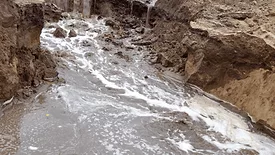Home » Keywords: » water quality
Items Tagged with 'water quality'
ARTICLES
Agency says approved compounds are not PFAS, while critics call for clearer oversight amid rising public concern
Read More
EPA Commits $3 Billion in New Funding to Tackle Lead in Drinking Water
Agency also redistributes $1.1 billion in unused funds as updated data reveals fewer lead service lines than previously thought
Read More
Texas Sent $223 Million to Rural Communities to Fix Water Infrastructure
Two years ago, Texas voters overwhelmingly approved the creation of the Texas Water Fund
Read More
Birchtech Teams Up with CEC to Expand Water Testing Services for Utilities Nationwide
Partnership to accelerate water testing for utilities
Read More
Santee Sioux Nation Remains Under Manganese Drinking Water Advisory
In effect until follow-up testing confirms manganese levels have fallen
Read More
Construction Firm is Ordered to Clean Up Wastewater Discharges into Cane Garden Bay
Chitolie Trucking Service, LLC must come into compliance with the Clean Water Act after violations
Read More
EPA Pledges $3 Million to Tackle Lead in Tribal Drinking Water Systems
The funding supports three projects that focus on removing aging infrastructure.
Read More
U.S.-Saudi Water Summit 2025 to Explore Global Partnerships in Water Innovation and Investment
High-level event in Silicon Valley aims to connect U.S. and Saudi leaders
Read More
Dig deeper into the drilling and water supply industry!
Build your knowledge with The Driller, covering the people, equipment and technologies across drilling markets.
SIGN UP NOWCopyright ©2025. All Rights Reserved BNP Media.
Design, CMS, Hosting & Web Development :: ePublishing




.webp?height=168&t=1762313000&width=275)
.webp?height=168&t=1761182710&width=275)





